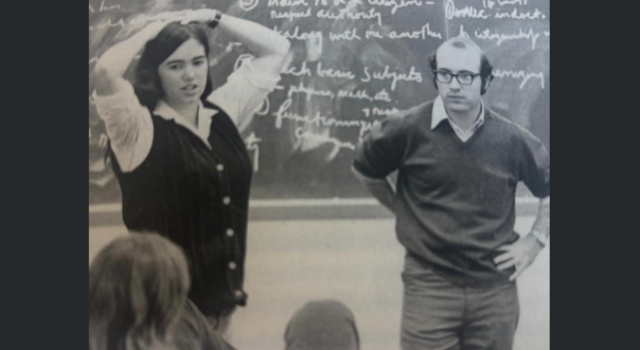Gerald Felix Warburg 74S Publishes History of Environmental Victory and Its Lessons for Policy Reform

Inspired by his Hampshire experience, Professor Warburg helped design an innovative interdisciplinary master of public policy program at a traditional university. A challenge he took on with his graduate students turned into a book about a successful grassroots political fight to preserve a natural landmark.
Saving Point Reyes: How an Epic Conservation Victory Became a Tipping Point for Environmental Policy Action documents the fight to save the Point Reyes National Seashore, a national park in California, from developers. Warburg utilized archival materials, oral histories, and new interviews with veteran federal policymakers to document the events that took place in the 1960s that led to a key turning point in the environmental movement.
“I undertook a study on a dare from a graduate class I teach at the University of Virginia (UVA) in the master of public policy program,” says Warburg, who is a professor of practice and previously served as assistant dean at the Frank Batten School of Leadership and Public Policy. “My assignment to my students was to use history to guide change; specifically to study a successful NGO-led campaign from the past and use lessons learned for current challenges.”
In a Hampshire-esque move — faculty learning alongside their students — Warburg took on the challenge too. Part of his curiosity in understanding and documenting the pivotal history of Point Reyes, which influenced the political landscape not just of California but of the rest of the country as well, was exploring this question: “How can we apply these lessons learned to the existential challenge of our time, the climate crisis?”
The answer, or answers, it seems, is as multifaceted and interconnected as the UVA program Warburg was part of developing, in which faculty marry psychology, economics, history, and political science while teaching leadership.
Writes Brown University Professor of Public Policy Eric M. Patashnik, “Warburg’s deeply researched, sophisticated account shows that no single factor is responsible for environmental progress. Instead, meaningful change occurs when grassroots coalitions, entrepreneurial leadership, issue framing, insider lobbying, political timing, and the evolving economic and electoral context converge to open new possibilities for governance.”
In a Hampshire-esque move — faculty learning alongside their students — Warburg took up the same challenge he assigned.
Warburg wanted to write a political science book that was not overly wonky, taking inspiration from his alum peers, the filmmaker Ken Burns 71F and the writer Jon Krakauer 72F, whose pioneering storytelling focuses on people. A driver of the work was to highlight the contributions of trailblazers who receive short shrift in other accounts. “Early environmental histories all feature the work of ‘Great Men’ — from John Muir to Teddy Roosevelt,” Warburg says, “My book explores a critical campaign where the heroes history should honor include several key women leaders who are barely mentioned in previous histories.
“The project grew directly from my Hampshire education,” he says. “Hampshire taught me to be a lifelong learner, and to create new ways of approaching content.” Warburg, who studied education and political science with the intention of becoming a high school history teacher, turned to a project for his Div III in support of affirmative action in busing in Boston, taking on timely race and integration issues.
His classmates told him, he says, “’Gerry, you’ve got to go to Washington.’” So, during a summer break, Warburg applied for an internship at the Senate. He went on to serve as a legislative assistant to Jonathan Bingham, of New York, and Alan Cranston, of California, members of the U.S. House and Senate leadership, and became a faculty affiliate of UVA’s Batten Center for Effective Lawmaking.
Over the years, Warburg has taught courses at the University of Pennsylvania’s Annenberg School of Communications, Georgetown University’s Walsh School of Foreign Service, Stanford University, and taught many Jan.-term classes at Hampshire.
Warburg is also the author of Conflict and Consensus: The Struggle between Congress and the President over Foreign Policymaking and Dispatches from the Eastern Front: A Political Education from the Nixon Years to the Age of Obama.



